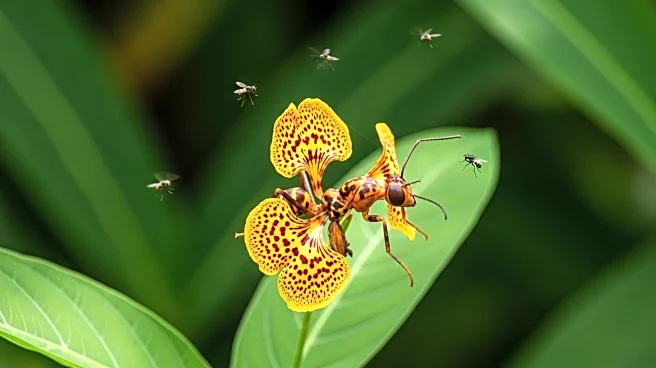What is the story about?
What's Happening?
Ko Mochizuki from the University of Tokyo has identified a unique floral mimicry in Vincetoxicum nakaianum, a dogbane species native to Japan. This plant emits a scent similar to ants attacked by spiders, attracting flies that feed on these insects. The flies, in turn, pollinate the flowers. This discovery marks the first known instance of a plant mimicking the odor of ants, expanding the understanding of floral mimicry. Mochizuki's research, published in Current Biology, was inspired by observing chloropid flies swarming around the flowers in the Koishikawa Botanical Gardens. His findings suggest that the scope of floral mimicry is broader than previously thought.
Why It's Important?
The discovery of ant mimicry in plants could have significant implications for understanding plant evolution and pollination strategies. By attracting specific pollinators through mimicry, plants like Vincetoxicum nakaianum may enhance their reproductive success. This research could lead to further studies on the evolutionary mechanisms behind floral mimicry and its role in biodiversity. Additionally, understanding these interactions can inform conservation efforts, particularly in ecosystems where pollinator species are declining. The study highlights the intricate relationships between plants and insects, emphasizing the complexity of ecological networks.
What's Next?
Mochizuki plans to investigate the evolutionary background of ant mimicry by comparing the pollination systems, evolutionary history, and genetic makeup of Vincetoxicum nakaianum and its relatives. He aims to explore other species within the Vincetoxicum genus and unrelated plant groups to uncover further examples of floral mimicry. This research could reveal hidden forms of mimicry and contribute to a deeper understanding of plant-insect interactions. Future studies may also focus on the ecological impact of these mimicry strategies and their potential applications in agriculture and conservation.
Beyond the Headlines
The discovery of ant mimicry in plants raises questions about the ethical and ecological implications of manipulating natural systems for human benefit. Understanding these mimicry strategies could lead to innovations in agriculture, such as developing crops that attract specific pollinators or deter pests. However, it also underscores the importance of preserving natural habitats and biodiversity, as these complex interactions are vital for ecosystem health. The study encourages a reevaluation of how humans interact with and impact natural systems, highlighting the need for sustainable practices.

















